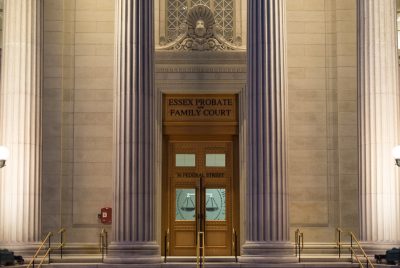Due Process and the Courts
What does the constitution say about due process?
The Fifth Amendment to the Constitution says clearly that no person shall be deprived of life, liberty, or property without the due process of law. Note that this says person, not citizen, and over the years the Supreme Court has consistently ruled that the Due Process Clause applies to all people in the United States.Do non-citizens have the right to due process in the U.S.?
Yes. The Constitution guarantees due process rights to all "persons," not just citizens. This means non-citizens, including undocumented immigrants, are entitled to fair treatment under the law. This includes the right to defend themselves in court. But recent Trump administration policies that speed up deportations and limit access to legal representation make it harder for non-citizens to get their fair day in court.- Access to legal representation Access to legal counsel is an essential part of our justice system and our democracy. In the criminal justice system, anyone facing even one day in jail gets a lawyer if they can't afford one. But immigrants facing deportation usually don't get that chance.The research is clear – the most effective way to ensure some level of due process for people navigating our complicated immigration system is for them to have trained attorney at their side. But Trump administration is now working to strip attorneys from as many people as possible, all in the name of increasing its deportation numbers. This attempt to eliminate basic due process will hurt people who already have few options.
- Fair day in court Due process guarantees that individuals have the opportunity to defend themselves in court. This includes non-citizens facing deportation.
Why is due process important?
We are seeing right now the importance of due process when it comes to President Trump's actions to carry out the so-called Alien Enemies Act, a 1798 wartime law that permits people to be deported outside of the normal framework of immigration law. President Trump has alleged that this law allows him to simply point at any person, declare them to be an alien enemy, and kick them out of the country without ever having a chance to see a judge. Thankfully, the Supreme Court said that is not true, and in a unanimous decision, ruled that people can challenge the Trump administration's invocation of the Alien Enemies Act. That is why due process is so important, because it means that no person can be rounded up and sent to another country without a chance to go to court and make the government prove their case.How is the American Immigration Council working to protect due process?
- We serve thousands of individuals in immigration detention centers through the Immigration Justice Campaign, our initiative with the American Immigration Lawyers Association. The Justice Campaign provides free legal services for immigrants who would otherwise have to navigate our complicated immigration system without a lawyer.
- We use the courts to demand a fair process for immigrants. Our litigation team is fighting back against the Trump administration’s blatant disregard for due process including filing a lawsuit challenging their illegal detention of immigrants in El Salvador’s notorious Terrorism Confinement Center (CECOT).

What Happens to Dreamers Now That the Supreme Court Is Hearing the DACA Case?
After months of speculation, last week the Supreme Court agreed to review three cases challenging the Trump administration’s decision to end Deferred Action for Childhood Arrivals (DACA). The Court is expected to issue its decision by June 2020, coming in the midst of the presidential race. In the meantime,… Read More

Supreme Court Rules Against Citizenship Question on 2020 Census
In a rebuke to the Trump administration, the Supreme Court ruled against adding a question on citizenship to the 2020 U.S. Census form—for now. Critics feared the question may discourage immigrant, mixed-status, and minority households from participating in the Census, resulting in widespread undercounting and dramatic shifts in political representation. Read More

Federal Court Tells ICE to Stop Arrests in Massachusetts Courthouses
In Massachusetts, U.S. Immigration and Customs Enforcement (ICE) officials are barred from making civil arrests in courthouses. Such arrests have a chilling effect on the administration of justice—those who fear civil arrest in court are much less likely to seek a court’s help for resolving disputes. Since 2018, an ICE… Read More

Class Action Lawsuit Seeks to Challenge USCIS’ Failure to Respond to FOIA Requests for Immigration Case Files
A class action lawsuit challenges the Department of Homeland Security and its component agencies’ nationwide practice of failing to timely respond to requests for immigration files under the Freedom of Information Act. Read More

Lawsuit Challenges Systemic USCIS and ICE FOIA Delays
This nationwide class action lawsuit challenges systemic delays in providing immigration files. Read More

Reinstatement of Removal
This practice advisory provides an overview of the reinstatement statute and implementing regulations, including how the Department of Homeland Security (DHS) issues and executes reinstatement orders. Read More

Groups Launch Legal Challenge to Trump Administration Policy on Jailing Asylum Seekers
The American Immigration Council, Northwest Immigrant Rights Project, and The American Civil Liberties Union, filed a proposed amended complaint in federal court today in order to challenge the Trump administration’s new policy that categorically denies bond hearings to asylum seekers. The policy, announced April 16 by Attorney General William Barr, targets asylum seekers whom immigration officers previously determined have a “credible fear” of persecution or torture if returned to the places they fled. Read More
Make a contribution
Make a direct impact on the lives of immigrants.



